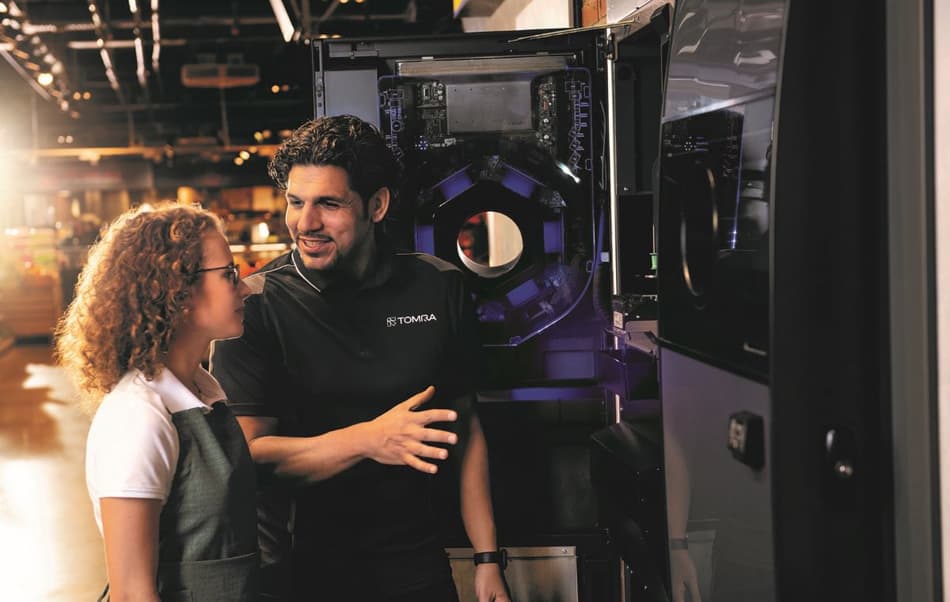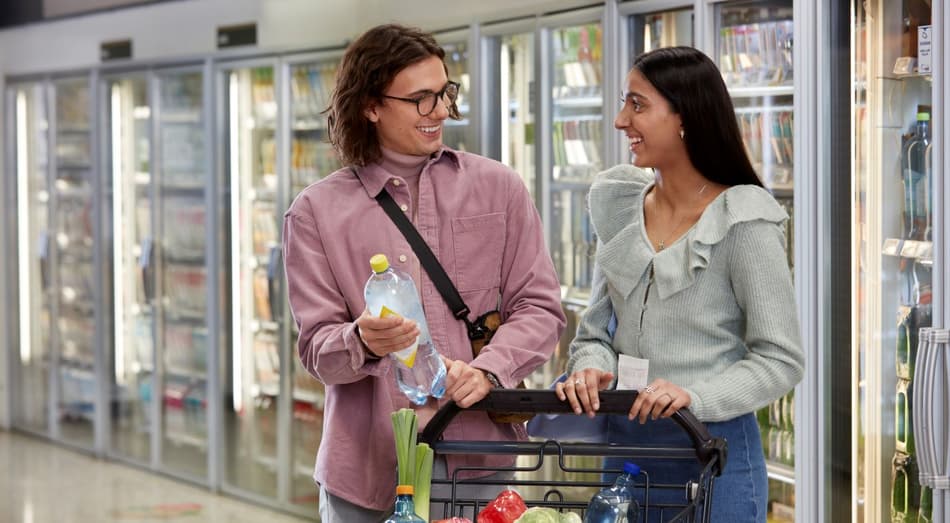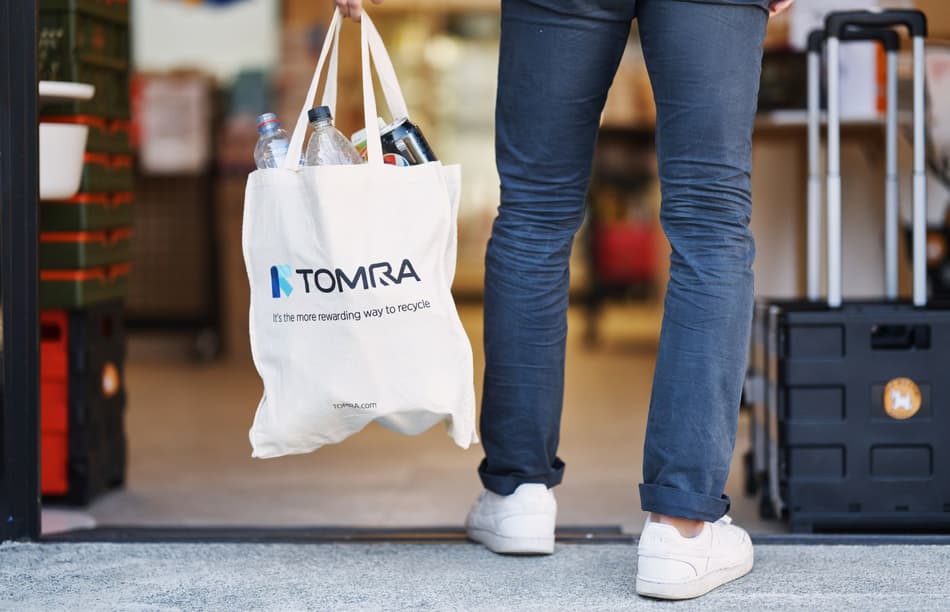European retailers get early look at reverse vending and deposit return at EuroShop
With several European regions set to introduce “deposit return systems” (DRSs) for drink container recycling in coming years, stores can get early insight into deposit return in Europe and retail involvement from reverse vending leader TOMRA, during the EuroShop trade fair (26 February to 2 March in Dusseldorf). DRSs typically legislate that beverage retailers serve as return points for drink containers, with retailers thereby playing a vital role in the success of a deposit system.
“Retailers can get ahead of the pack at EuroShop, by learning more about the role of supermarkets and grocery stores in drink container recycling, upcoming deposit systems and the reverse vending equipment that retailers can use to participate in those recycling programs,” said Harald Henriksen, Head of TOMRA Collection.

During EuroShop, TOMRA will also preview concepts for the next generation of TOMRA reverse vending solutions, and release a report from its latest consumer research, investigating European consumers’ shopping habits and preferences around drink container recycling.
The company has 50 years' experience in deposit return, working in 40 deposit markets globally, in every part of the value chain. More recently, TOMRA has worked to roll out reverse vending infrastructure in new and expanded DRSs in Latvia and Slovakia (2022), The Netherlands (2021-2022), Australia (2017-2020), and Lithuania (2016).
What can deposit return systems mean for retailers?
DRSs work by adding a small deposit to the price of a drink, which is refunded to the consumer when they return the empty container for recycling. High-performing DRSs see up to 98% of drink containers returned for recycling; no other waste collection systems reach similar rates. DRSs are also a means to work towards the European Union’s Single-Use Plastics Directive, which sets out for member states to separately collect 90% of all plastic bottles by 2029. The newly proposed draft of the Packaging & Packaging Waste Regulation also makes deposit systems mandatory, including return-to-retail collection, unless that 90% target can otherwise be reached.
DRSs work by adding a small deposit to the price of a drink, which is refunded to the consumer when they return the empty container for recycling. High-performing DRSs see up to 98% of drink containers returned for recycling; no other waste collection systems reach similar rates. DRSs are also a means to work towards the European Union’s Single-Use Plastics Directive, which sets out for member states to separately collect 90% of all plastic bottles by 2029. The newly proposed draft of the Packaging & Packaging Waste Regulation also makes deposit systems mandatory, including return-to-retail collection, unless that 90% target can otherwise be reached.

Deposit systems often include “return-to-retail” legislation, requiring that stores selling beverage containers also take them back for recycling. Nine out of 10 of the world’s highest-performing DRSs employ return-to-retail collection, achieving an average return rate of 92%.
In a return-to-retail model, retailers attract store visits as consumers return their containers, and help recycle a retail product that can otherwise end up as litter. Retailers demonstrate their sustainability commitments and engage with their customers on issues they care about. Consumers also benefit from a return location that’s convenient and already part of their habits, making it as easy to return the containers as it was to buy them in the first place.
The role of reverse vending
To make container returns more efficient for both consumers and stores, DRSs often utilize “reverse vending machines” to automate the process. These machines instantly identify, count and sort eligible containers, and pay out the correct deposit refund – more efficiently than through manual, human handling.
TOMRA’s reverse vending portfolio has solutions for all types of customers, from the smallest convenience store to hypermarkets and the largest bottle depots, and for all types of DRS containers. TOMRA also provides digital tools and service to enable retailers of any size and type to put recycling to work for their store.
TOMRA operates more than 80,000 reverse vending installations, and receives over 45 billion containers for recycling annually. The company was founded specifically to develop technology to support retailers handling container returns in a DRS.
“Retailers meeting TOMRA at EuroShop can get a head start on understanding deposit return and how to put recycling to work for their stores. They can try out a range of reverse vending technologies, discuss with our local experts how the solutions can be tailored to individual stores, and learn how to build a great recycling experience for their customers,” explains Harald Henriksen.

Reverse vending concepts and consumer research unveil at EuroShop
TOMRA at EuroShop will give a sneak peek at new reverse vending concepts spanning their entire product portfolio, with concepts for two front-end reverse vending machines, backroom storage, digital app, and service solution. TOMRA has also launched three new APIs for its TOMRA Collection Developer Portal, to help retailers integrate web services into their own online loyalty programs and apps.
TOMRA will also unveil its research report, “How recycling habits impact shopping behavior: Consumer engagement with deposit return systems in Europe”. Surveying consumers in Sweden, Norway, Finland, Denmark, Germany, the Netherlands and Slovakia, it found shoppers factor in the state of the store reverse vending facilities when they decide where to return their empties. Sign up here to pre-register to receive it.
TOMRA's EuroShop booth is located in Hall 7A, at booth B07. Visit our EuroShop site at euroshop.tomra.com. To arrange a commercial or media meeting, contact [email protected].
About TOMRA Collection:
TOMRA Collection provides reverse vending machines for Clean Loop Recycling, to transform society’s habits and keep valuable resources in a continuous loop of use and reuse. The company’s solutions collect aluminum, plastic and glass beverage containers to be continually reused and recycled back into new bottles and cans. With over 80,000 installations across more than 60 markets, TOMRA reverse vending machines capture over 45 billion used bottles and cans each year. This reduces reliance on raw materials, and ensures fewer containers end up in our streets, oceans and landfills. TOMRA’s reverse vending machines, digital solutions and service make recycling easy for the industry, system owners, retailers and consumers to contribute to a more sustainable planet. Visit our Reverse Vending pages on tomra.com, and follow us on Facebook, Twitter, Instagram and LinkedIn.
TOMRA Collection is a division of TOMRA Group. Today, TOMRA is leading the resource revolution to transform how the planet’s resources are obtained, used and reused to enable a world without waste. The company’s other business divisions comprise TOMRA Food and TOMRA Recycling. The Group employs approximately 4,600 globally and is publicly listed on the Oslo Stock Exchange.
